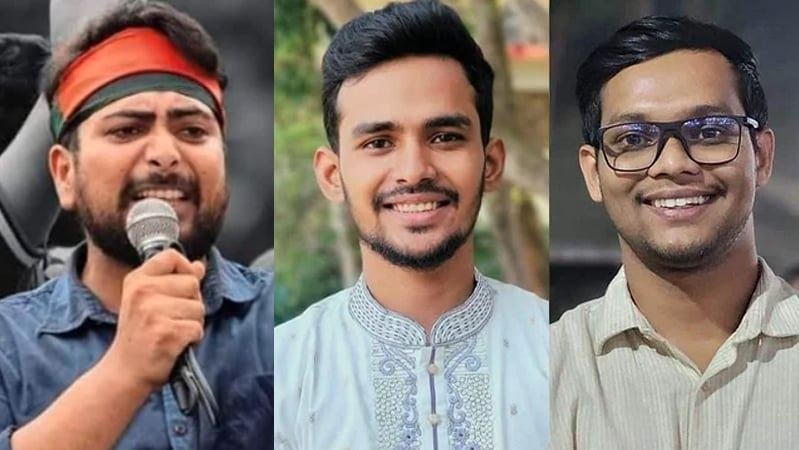News Flash
News Flash

DHAKA, July 25, 2025 (BSS) - On July 26 last year, three coordinators of the anti-discrimination student movement Nahid Islam, Asif Mahmud Shojib Bhuyain and Abu Baker Majumdar were taken into Detective Branch (DB) custody of the Dhaka Metropolitan Police (DMP) from a city hospital.
Earlier that afternoon, Nahid's family alleged that a group of people in plainclothes identifying themselves as members of a law enforcement agency picked up Nahid from the Gonoshasthaya Nagar Hospital around 3:30 pm. Shortly after, Asif and Baker were also picked up from the hospital.
At around 11:30pm that night, the DB police acknowledged that they picked up the three coordinators of the quota reform movement for security reasons.
The police also informed that they would interrogate Nahid, Asif and Abu Baker whether they had any information related to the violence during the movement.
These three had previously been abducted. On July 19 night, after the nationwide "complete shutdown", announced by the quota reform movement, Nahid was picked up from Nandipara in Khilgaon. He was later found abandoned in Purbachal early hours of July 21 and had since been receiving treatment at Gonoshasthaya Nagar Hospital.
Asif and Baker were also abducted on July 19. After five days, on July 24, Asif was dropped off in the Hatirjheel area and Baker in Dhanmondi. They too had been under medical care at the same hospital since then.
Earlier, Nahid was picked up in the early hours of July 20 allegedly by law enforcers and allegedly tortured physically while he was found injured in the city's Purbachal area in the early hours of July 21. Both Asif and Abu Bakar were also picked up on July 19 while they were blindfolded and left in Hatirjheel and Dhanmondi areas on July 24.
They were undergoing treatment at the Gonoshasthaya Nagar Hospital since they were released from the detention.
However, Asif, now an adviser of the current interim government, in his book 'Matribhumi Othoba Mrityu' claimed that he and Nahid were kept confined at 'Aynaghar (glass house)'.
Besides, the deposed home minister Asaduzzaman Khan Kamal while talking to reporters after a meeting with law enforcement agencies that night said the trio had been taken to the DB custody "for their own safety" as they were experiencing insecurity.
Amid the nationwide curfew with flexibility from 8pm to 5pm on July 26, the members of law enforcement agencies arrested at least 765 across the country between July 25 night and July 26 afternoon as part of their combing operation.
According to a Dhaka based leading Bangla daily- Prothom Alo- of them 207 were detained from the capital alone taking the total number of arrests in the capital over the last 10 days to at least 2,416 while the total number of arrests across the country stood at least 6,264 from July 17.
Besides, three more individuals injured in previous clashes during the quota reform movement succumbed to their injuries in Dhaka and other districts on July 26.
On that day, Begum Rokeya University, Rangpur (BRUR) administration provided financial support to the family of its English department student Abu Sayeed, who was the first martyr of the July Uprising.
In Sylhet, students of Shahjalal University of Science and Technology named the main gate of the university 'Shaheed Rudra Toron' in honor of Rudra, who was killed in the movement.
Besides, referring to the nationwide mass arrests and repression on opposition leaders and activists, BNP Secretary General Mirza Fakhrul Islam Alamgir called for a "national unity" to press their one-point demand- the resignation of the government.
On the same day, Dr Rupa Huq, a Bangladeshi origin British MP from Labour Party, raised questions in the United Kingdom (UK) Parliament regarding the situation in Bangladesh, particularly the unrest surrounding the quota reform movement. She sought the UK government's stance on the issue.
The Canadian government expressed deep concern over the violence during the student movement.
Besides, Transparency International Bangladesh (TIB), in a statement on July 26, said staging peaceful protests to express dissent or demands are not crimes but constitutional rights.
Sushashoner Jonno Nagorik - SUJAN demanded impartial investigations into each death that occurred during the quota reform protests. The organization also called for an end to indiscriminate arrests and cases, and for ensuring the safety of students.
Besides, leftist parties and alliances called for a political solution to the crisis, holding the government accountable for the deaths and destruction during the protests.
The Bangladesh Economic Association called for impartial investigations into the casualties and properties damaged during the quota reform movement, demanding trial for those responsible.